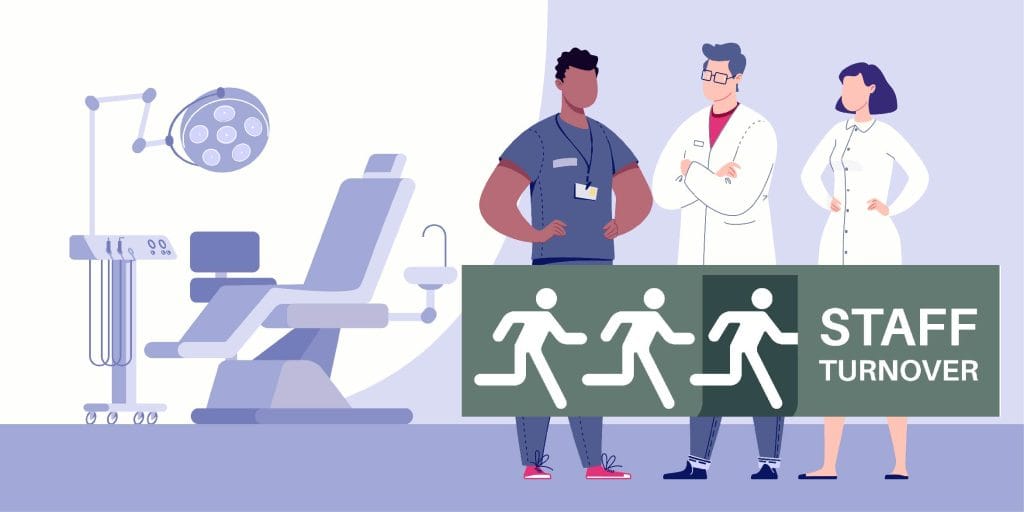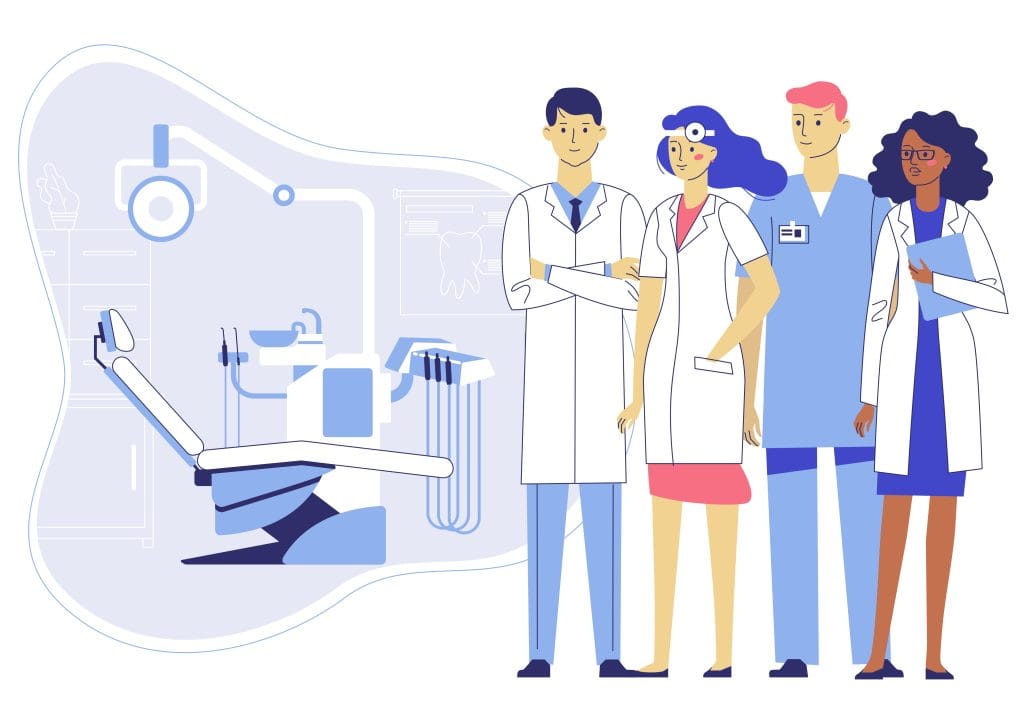 Are you having trouble finding staff for your dental practice? You’re not alone.
Are you having trouble finding staff for your dental practice? You’re not alone.
We’re in strange times with the labor market. Wages have gone way up and there are record numbers of job openings.
So not only is it more expensive to hire, but you’re also competing with many other healthcare practices, as well as, large companies and big-box retailers that are just as desperate to hire as you are.
In a blog post a couple of weeks ago, What’s Going On With the Labor & Staffing Market?, our COO, Jeff Blumberg, proposed an interesting idea: Since you already must pay higher wages, then instead of hiring two entry-level positions, consider hiring one stellar employee with a great record of experience at a significantly higher pay rate. One stellar employee that knows what they’re doing can be more productive, and despite paying the one employee much more, it’s still less costly than two employees.
I love this idea, especially if you have good systems and training in your office that enables them to be super-efficient and productive.
But in this blog post, I want to discuss the flip side of the coin.
What if you really need to fill a position, and you haven’t had any luck finding a superstar candidate with years of experience running a highly successful practice?
And beyond that, what if you’re having difficulty finding employees with any relevant dental experience at all?
You may consider opening up your search to include candidates without any prior dental or healthcare experience.
Prior dental experience—it can be a double-edged sword
 We tend to get starry-eyed about prior experience. “Oh! They were an office manager at another office!” Or “They already know how to use Eaglesoft/Dentrix!” Or “They’ve been in dentistry for 15 years, so they already know how everything works!”
We tend to get starry-eyed about prior experience. “Oh! They were an office manager at another office!” Or “They already know how to use Eaglesoft/Dentrix!” Or “They’ve been in dentistry for 15 years, so they already know how everything works!”
But this experience isn’t always necessary and can even be detrimental to the practice.
Here’s where it can be detrimental:
I have done countless dental practice assessments, I’ve placed hundreds of mystery calls to dental front offices, and I’ve personally visited many offices to review their management systems.
And I’ll tell you one thing: There. Were. A. Lot. Of. Problems.
I saw a lot of bad habits. I saw a lot of poorly-trained staff. I saw a lot of employees doing things that the owner had no idea was happening.
So when you hire someone with experience, you naturally tend to skimp on the training—in fact, that’s the whole benefit of it in the first place: you don’t need to spend time training them. You expect them to just go right onto the job and do their thing.
Much of the time, you’re just leaving them to their bad habits or different ways of doing things that don’t fit in your office. And this creates problems.
There is value in finding willing staff
 One of the worst qualities in an employee is someone that “already knows everything.”
One of the worst qualities in an employee is someone that “already knows everything.”
My first priority is to find someone that wants to work hard, wants to learn, and has the right attitude.
For me, experience and education are always secondary to that. If they happen to have experience, great. If not, we can give it to them.
Yes, it’ll take a bit more effort and time, but at least we’ll train them the right way. And even with an experienced hire, we’ll probably need to retrain them on a lot of things anyways.
In fact, one of the best office managers I’ve seen managed a fast-food restaurant prior to joining the dental practice. They were a competent, hard-working person that wanted to learn about dentistry, and that was the most important thing.
(Note: Our on-demand video training platform, DDS Success, makes it a lot easier to train new employees. Schedule a free demo here.)
What positions should you open up to non-experienced candidates?
In the practices I ran, I would interview anyone, regardless of experience, for any position that doesn’t require licensing/certification in your state.
This included:
- Receptionists
- Scheduling Coordinators
- Insurance Coordinators
- Treatment Coordinators
- Office Managers
- Assistants (obviously if they will be doing any functions that require certification/licensing, such as x-rays, then they’ll need that.)
Feel like you don’t have time to train them?
 This is really the crux of the matter. It’s why we all want to look for employees with experience. Especially if you’ve had some regular turnover, making time for constant training can become a real thorn in your side.
This is really the crux of the matter. It’s why we all want to look for employees with experience. Especially if you’ve had some regular turnover, making time for constant training can become a real thorn in your side.
I have a few things to say about this:
If you don’t have policies and systems in place that employees can be trained on easily—you have a bigger problem that needs to be addressed anyway.
Without clearly laid out policies, you have no agreement in your group as to how the practice should operate.
So, if you’ve been exasperated wondering why your schedule is hectic, why payments are coming in late, why the cancellation rate is high, why patients are falling off their recall schedule—it’s because there’s no clear policy on how these things should be handled in the practice and everyone is just doing their own thing.
So you need to put systems in place in your practice, and when you do that, it’ll also make training much, much easier.
If you don’t make the time now, you’ll never have time in the future
I know it’s tough taking the time out of your day to train employees. If you had spare time, you wouldn’t need to be hiring people.
But if you don’t find a way to make the time now, you’ll never get out of this hamster wheel of being over-worked endlessly. The point of doing good training is to get things running smoothly so you’re not so time-bankrupt in the future.
Take baby steps toward creating your training materials
 You don’t have to codify every function of the dental practice and create encyclopedic job manuals all at once.
You don’t have to codify every function of the dental practice and create encyclopedic job manuals all at once.
Start one step at a time.
What’s the first thing your new hire will be doing?
If it’s answering the phones, then take a few minutes to put together a policy and instructions on how it should be done, and then train them on that.
Similarly, if they’ll be setting up the room and sterilizing instruments, take some photos with your phone of a properly set up room and write down the key instructions for them to read and practice.
Then while they’re getting experience doing that thing for a day or two, spend another few minutes putting together the next thing.
Then eventually you can assemble all of these into one cohesive job manual.
Use resources to help, so you don’t have to do it all yourself
There are a lot of resources out there that you’re probably not taking full advantage of.
Softwares like Dentrix usually have training videos available. And there are several products out there with video explanations of dental procedures and terms for the basics on dentistry.
And if you compile a glossary of the important terms used in your office, you won’t need to explain them all to each person individually in the future.
And lastly, I’ll plug our own product—DDS Success. This is our on-demand video training platform that we designed specifically to make it easier for you to train your employees.
DDS Success provides efficient front office systems and training for every position. Instead of you working to create effective systems and training each employee on every little detail, have them watch the videos to catch up on a bulk of the training and become highly productive right off the bat.
Of course, there are still specifics of your own office you’ll need to train them on, but DDS Success makes it a heck of a lot easier and gives you new strategies to drive practice growth and profitability.
You can schedule a free demo here to see how it works.
I hope this helps! And if you’re having trouble with hiring or any other area of practice management, request a free consultation here. We’d be happy to do a practice assessment and give you some pointers.
And you can always reach me anytime at JeffS@mgeonline.com.



No Comments
Be the first to start a conversation